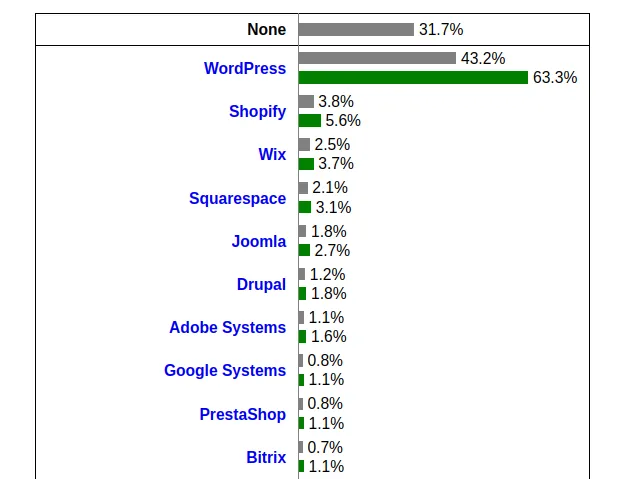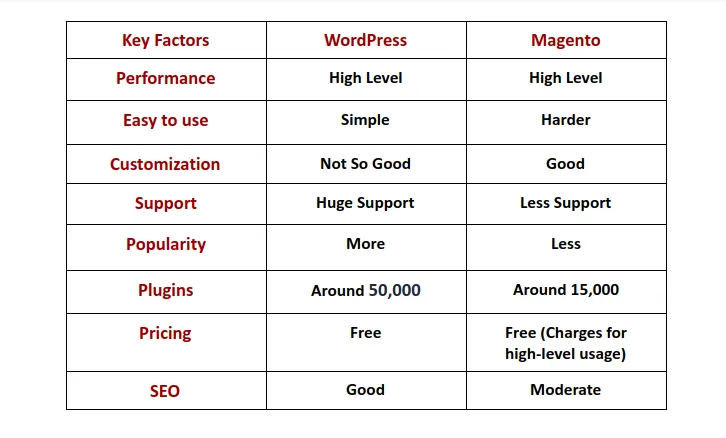There are so many alternatives when it comes to eCommerce website development, but not all of them are the same and have robust features and functionalities. Usually, whenever anyone talks about the best eCommerce website builder, Magento and WordPress are the two names that strike in everyone’s mind.
Both WordPress and Magento online store building platforms are good and best suited for the eCommerce sector. However, when it comes to choosing the top one among Magento vs WordPress, then it can be pretty challenging.
Moreover, to help you out with this, we have broken down some of these key considerations, which will support you make the best decision as per your project’s needs and requirements.
About WordPress
WordPress is an open-source platform and offers eCommerce features on the front end as well as in coding. It lets you choose between a wide range of themes and plugins, from very basic to advanced ones, for building your online store. The main highlight of this CMS is its blogging feature, which makes it easy to give updates about products; whereas, its high customization feature lets you create a unique website.
Also Read: Top WordPress Development Companies To Seek
Key Takeaways:
- 57 distinct languages are available for WordPress.
- As per the w3techs, WordPress is the most famous CMS by a landslide, with 42.5% of websites utilizing this platform, representing a whopping 65.2% of the CMS market.

- As of May 2021, about 409 million people see around 20 billion pages every month through WordPress.
- Around 64 million websites currently utilize WordPress.
Experience seamless and secure online shopping with our eCommerce services
Pros and Cons of using WordPress
Pros
It is a free platform, and anyone can download the CMS. Thus, it has the edge over Magento that offers paid service to its users. The user-friendly interface makes WordPress easy for beginners to learn as well as operate. With thousands of themes available in its theme directory section, you will get access to a broad range of free and premium themes for building an online store.
WordPress has excellent SEO features, which make it easier to rank your business website on the top of search engines like Google or Bing. The CMS provides easy accessibility of content management system (CMS) tools, so you can update your products from any location at a time convenient for you.
Also Read: 10 Reasons Why WordPress Is Better Than Other CMS
Cons
Less flexibility on storefront end: Unlike Magento, the WordPress eCommerce platform doesn’t offer extensive customization features for building an online store. It comes with a set of predefined themes and plugins that limits you to very basic customizations options such as changing colors or rearranging menus in your website.
Therefore, if you want advanced functionalities like built-in marketing tools, better SEO options, and more payment gateways, you will have to invest in premium themes.
WordPress doesn’t support all types of eCommerce functionalities: The WordPress platform is great for blogging purposes, but totally lacks when it comes to offering advanced features needed by the eCommerce sector, such as multi-currency functionality or product bundles.
The platform is resource-intensive and requires a dedicated server to run, making it unsuitable for eCommerce websites that require high traffic. Moreover, to make efficient use of WordPress in website development, you can hire WordPress developers from the leading WordPress development company.
About Magento
The Magento is built on the Symfony framework, which makes it an open-source eCommerce platform, offers excellent features for online store development, and allows users to build their own customized applications through its programmatic interface. The CMS provides both front-end and back-end development functionalities and is a great choice for customizing your website as per your business requirements.
Key Takeaways
- 11% of the websites employing Magento are based in the US. (BuiltWith)
- Over 250,000 merchants globally use Magento as their eCommerce platform.
- Famous names like Omega Watches, Ford, Christian Louboutin, and Bulgari employ Magento. (Paul Rogers)
Pros and Cons of using Magento
Pros
It is an open-source platform, and the code is available publicly on GitHub. This makes it more flexible and customizable to build a unique online store that perfectly fits your business needs.
The CMS offers a top-notch user experience with its Magento templates, which are clean and professional. It provides a great variety of payment options for your online clients, such as PayPal, Skrill, cash on delivery, etc.
Cons
It’s too complicated for beginners: The biggest drawback when working with Magento is its complexity as you need extensive knowledge about coding languages such as HTML, CSS, etc., to manage the platform. It’s not so user-friendly and doesn’t offer support for third-party themes or plugins, which means you will be required to hire Magento developers who have expertise in the Symfony framework.
It leaves no scope for customizations: The biggest drawback of using Magento is that it lacks extensive customization features needed by eCommerce businesses. The platform doesn’t support multiple payment options and lacks marketing tools, which is necessary for building an online store these days.
Also read: WooCommerce vs. Shopify vs. Magento
Similarities Between WordPress and Magento
The following are some similarities between both these platforms:
• Both Magento and WordPress offer a range of themes. You can pick any theme according to your requirements and budget along with required features such as on-site payment gateway integration, multi-currency support, etc.
• They also have different plugins that you can use for your online store development that help you in offering an enhanced user experience.
• They both are highly customizable and offer unlimited options for front-end as well as back-end customization of the website.
WordPress vs Magento: Difference Between Both Platforms
While both Magento vs WordPress is excellent eCommerce platforms, some major differences can make you choose one over another. The below-mentioned points will highlight this differentiation between them:
• The main difference is in their coding language. You have to code using PHP for Magento, whereas with WordPress, you don’t need any coding knowledge.
• Another difference between these platforms lies in their architecture, which results in different technical support options available for them. You will find tons of resources available online about WordPress users’ issues as compared to the ones related to Magento.
• WordPress is easy to use and offers good support, but Magento has limited resources. So you need the help of a professional eCommerce development services for it.
Also read: Everything You Need To Know About Magento 2 Multi-Vendor Marketplace
WordPress vs Magento: Choosing The Best eCommerce Site Builder Platform
Here I have mentioned a few parameters on comparing these pointers; you will be able to know which eCommerce development platform will be best for online store development.
1. Performance
WordPress is lighter and faster, as it takes up lesser resources than other eCommerce website development platforms. Moreover, Magento has an inbuilt caching feature to provide high-performance to its users, which makes both the options equally good for performance.
2. Code Quality
While Magento scores highly in terms of code quality, WordPress is not so good. However, as per the latest versions, it has improved a lot and now offers better quality than before. Also, the new Gutenberg editor for Magento seems to be buggy, which makes both platforms equal on this front.
3. Security
Since it is an open-source platform, WordPress offers a host of plugins that can be used to manage and enhance your website security. On the other hand, Magento has low chances for malware or hacks due to its strong back-end code quality.
4. Customization
The ease of customization depends upon how much control you have over things. Magento offers full control to its users and allows them to make changes according to their needs. WordPress, on the other hand, is easy for beginners but not so good when it comes to customization as you won’t have much flexibility while performing advanced tasks in comparison with Magento.
5. Ease of Use
Both eCommerce website development platforms are equally good in terms of ease of use. However, the Gutenberg editor for Magento needs a lot of improvements to make it more user-friendly and easy to work with as compared to WordPress.
6. Support
Both platforms offer support through community forums or official documentation but don’t have dedicated customer service teams. Also, since both are open source, you will find ample information online through various blogs and forums to resolve your queries.
Experience seamless and secure online shopping with our eCommerce services
7. Popularity
WordPress is more popular than Magento, which may be a crucial factor for most E-commerce businesses when choosing open source eCommerce platforms as per their project’s needs and requirements.
8. Plugins
WordPress offers more than 50,000 plugins, whereas Magento has around 15,000 modules and add-ons. So WordPress wins the game if we talk about plugin support for eCommerce website development.
9. Hosting
Magento requires you to purchase your own hosting service, as it is a self-hosted application. However, WordPress is a hosted CMS and can be easily installed on your preferred hosting service provider.
10. SEO
WordPress is better than Magento when it comes to SEO as the former allows you to make changes in your permalinks structure, improve page titles and meta descriptions for all posts. On the other hand, Magento needs customization at a code level, which makes it difficult for beginners who are new to website development or eCommerce store owners looking for quick solutions.
11. Pricing
When it comes to pricing, Magento offers free plans for basic functionalities, but if you need certain features and advanced functionality, then there are paid plans. On the other hand, WordPress is completely free.
12. Functionalities Offered
If you want a CMS that has extensive features related to the eCommerce sector, such as product bundles, coupons, etc., then go with Magento. However, if you want a blogging website only, then go with WordPress.
Also Read: WordPress Vs Shopify: A Detailed Comparison For ECommerce Store
WordPress vs Magento: Comparison Table
The comparison table mentioned here will help you simply analyze which one is best among Magento and WordPress.
WordPress and Magento both offer high-quality eCommerce website development platforms. However, if you need a flexible CMS with better control over the functions and features, then Magento is your best bet. If you are seeking an open-source option that offers excellent performance, then go for WordPress, as it is faster than other options available in the market.
Read More: 15+ Top Magento Companies to Choose for Your eCommerce Project
Wrapping Up
Magento vs WordPress offers a variety of different features, but they both have pros and cons. If you want to make sure your eCommerce website is built on the right platform, it’s critical to determine what your needs are first before making any decisions.
After picking the suitable platform per your eCommerce project need, don’t forget to avail of Magento development services and WordPress development services from the best Magento eCommerce development company and WordPress development company (ValueCoders), respectively. By doing so, you will be able to stay away from all hassle of all eCommerce website development and ultimately will be able to develop a world-class online store.






